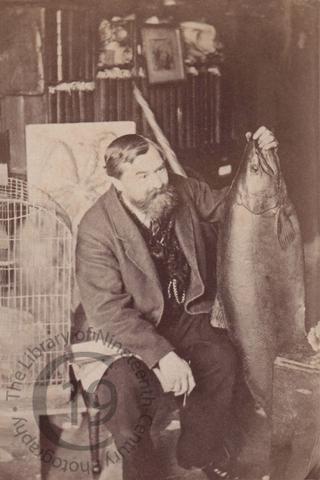
Frank Buckland
A carte-de-visite portrait of Francis Trevelyan Buckland (1826-1880), better known as Frank Buckland, who was a surgeon, zoologist, popular author, natural historian and pisciculturalist. In 1865 he founded at his own expense the Museum of Economic Fish Culture in South Kensington. Two years later he became Inspector of Salmon Fisheries, a post he retained for the rest of his life. He was a frequent contributor of papers on all matters piscatorial to scientific journals and the author of such works as Fish Hatching (1863), Log Book of a Fisherman and Zoologist (1876) and Natural History of British Fishes (1881). He also took a great interest in the establishment of public aquariums and his advice was often sought on the management of these popular institutions.
Born in Oxford on 17 December 1826, he was the eldest son of Canon William Buckland, Dean of Westminster, a noted geologist and palaeontologist, and Mary, a fossil collector, palaeontologist and illustrator. He was educated at Winchester and Christ Church, Oxford. After a brief career as an assistant surgeon in the 2nd Life Guards, Buckland devoted himself to natural history. He was a key member and founder of the Acclimatisation Society in Britain, an organization that supported the introduction of new plants and animals as food sources. A pioneer of zoöphagy, his favourite research was eating the animal kingdom. This habit he learnt from his father, whose residence, the Deanery, offered such rare delights as mice in batter, squirrel pie, horse's tongue and ostrich. Buckland's own home, 37 Albany Street in London, was famous for its menagerie and its exotic menus, including, at times, boiled elephant trunk, rhinoceros pie, porpoise heads, and stewed mole.
According to his entry in the Dictionary of National Biography, ‘he devoted all his energies not merely to the duties of his office, but to the elucidation of every point connected with the history of salmon, and endeavoured in every way to improve the condition of the British fisheries and of fisher-folk in general. These objects involved frequent visits to the rivers and coasts of the country, when he was ever a welcome guest among high and low, and was thus continually adding to his stores of information. […] Genial, sagacious, enthusiastic, always prone to look at the humorous side of a subject, Buckland aimed rather at enlisting the sympathies of others in his favourite studies than at acquiring the name of a profound writer on science. He held the ordinary usages of society in supreme contempt when they appeared to interfere with his zeal for experiment and research in natural history, and his friends love to recall him, now wading into some icy cold river to capture salmon for the purpose of artificial breeding, now smoking and in his shirts sleeves as he arranged his curiosities at South Kensington, and now again humorously dilating in his house in Albany Street on the habits of pet animals which generally ran loose about his rooms. Numberless as were his personal friends, they were few compared with those who knew and loved him from his books, owing to the unstudied eloquence of all he wrote and the attractive manner in which he descanted on his favourite pursuits. […] The native birds, beasts, and fishes lost a friend and protector when Buckland died. Under his love of nature and the extreme interest which he took in biological studies lay a profound but childlike faith.’
On 11 August 1863 he married Hannah Papps, who had at this point already been living with him for some time as his ‘housekeeper’ (1861 census).
Frank Buckland died, aged 54, on 19 December 1880. His death certificate records the cause of death as hepatic disease and bronchitis although the actual cause may have been pulmonary tuberculosis. He was buried in Brompton Cemetery, London.
Photographed by Samuel A. Walker of London.
Code: 127123




